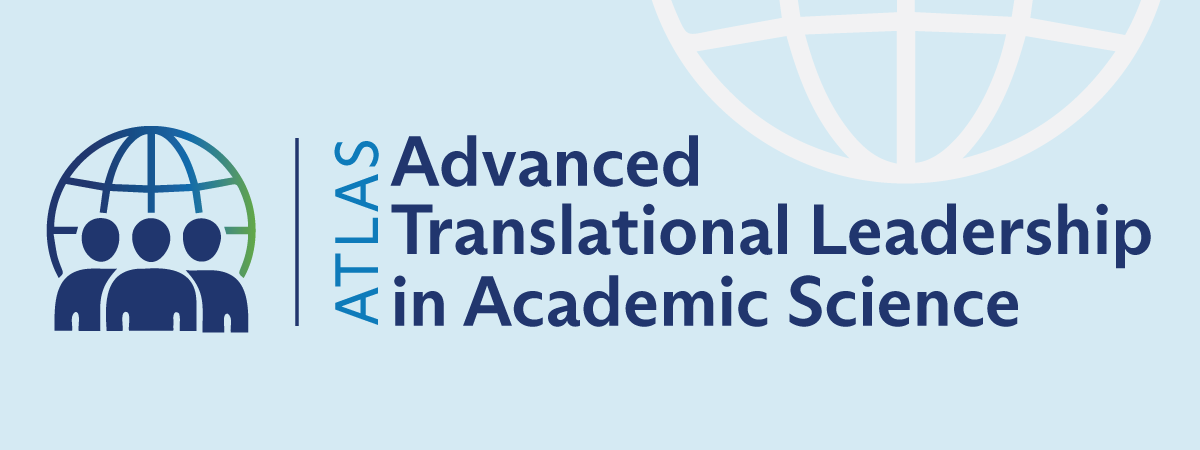The Advanced Translational Leadership in Academic Science (ATLAS) Program is a leadership in team science program intended for select mid-career and senior level investigators (Associate Professor or Full Professor). The goal is that investigators will be equipped with skills to become leaders in team science, and also form new collaborations across the partnering institutions. ATLAS will start in March of 2026 and will consist of four 2-day sessions (March, May, July, September) all taking place at Case Western Reserve University (CWRU) campus. The focus of the sessions will incorporate a team project, assessments, leadership skills and various team workshops.
The goals of ATLAS are to
- Increase collaboration among the partnering institutions
- Equip investigators with skills to lead team science.
This program also aims to:
- Provide an environment for new inter-institutional collaborations to be established
- Establish a group of researchers that can act as a resource to one another
- Provide knowledge of team science and reiterate the importance of doing multidisciplinary science in clinical and translational research.
Participating institutions include: Case Western Reserve University, Cleveland Clinic, VA Northeast Ohio Health System, MetroHealth, Northeast Ohio Medical University, University Hospitals, and University of Toledo.
Components of the Program
- Investigators will be split into small groups consisting of 4-5 investigators (only 1 investigator from each partnering institution).
- Groups will take on a challenge that has been identified by leadership and work to establish a plan for solutions to this issue.
- Participation in a 360 evaluation and creating a plan based on the results of the evaluation
- Partaking in various assessments to understand how the investigators personality, behaviors, and conflict style ultimately influence their leadership
- Teach skills related to emotional intelligence, negotiation, teamwork, effective communication etc.
2026 Program Dates
March 5-6, 2026
May 7-8, 2026
July 9-10, 2026
September 10-11, 2026
Program Completion
Attendance to all 8 sessions is mandatory. Upon successful completion of the program, investigators are eligible for a pilot award to be spent on research if a new research collaboration is established as a result of this program. Additionally, vouchers will also be available to investigators that successfully complete the entire program to be used towards an CTSC related service.
--
The ATLAS program is modeled after the Leadership Innovation in Team Science (LITeS) program that originated at the University of Colorado and has since been running at the University of Minnesota.
To Apply
We are excited to announce that we are accepting nominations for the third annual ATLAS Program. ATLAS only accepts 20 applicants per year. ATLAS-3 will start in March of 2026 and will consist of four 2-day sessions. The focus of these sessions will incorporate a team project, assessments, leadership skills and various team workshops. Please send your nominations to atlas-ctsc@case.edu , including both the name of the individual and their email by October 20, 2025. Self-nominations will also be accepted. Individuals chosen for the program will then receive an email with a Qualtrics application.
Partifcipating institutions include: Case Western Reserve University, Cleveland Clinic, MetroHealth, Northeast Ohio Medical University (NEOMED), University Hospitals, University of Toledo, and the VA Northeast Ohio Healthcare System.
Please note that an approved application will require confirmation of attendance of all sessions in their entirety. In person attendance for the entire program is mandatory.
Thank you to our 2024 & 2025 cohorts!
--
Meet our Team
Grace McComsey
Grace McComsey, MD is the Vice Dean for Clinical and Translational Research, Director of the Clinical and Translational Science Institute (CTSI), Principal Investigator of the Clinical and Translational Science Collaborative (CTSC) of Northern Ohio, and Professor of Pediatrics and Medicine at Case Western Reserve University. Dr. McComsey’s work focuses on HIV and Long-COVID complications and treatment.
McKenzie Ritter
McKenzie Ritter, PhD is the Director of the ATLAS program and the Assistant Director of Research Education and Training within the Clinical and Translational Science Collaborative at CWRU. She received her PhD in Physiology in the Spring of 2023 and has recently joined the CTSC (Summer 2023).
Judith Albino
Judith Albino, PhD is President Emerita and the former Director of the University of Colorado LITeS program. Dr. Albino is a health and community psychologist whose research focuses on health disparities and prevention interventions for oral health. She has brought her expertise from the LITeS program to facilitate sessions throughout the program.
Mary Dolansky
Mary Dolansky, PhD, RN is a Sarah C. Hirsh Professor in the CWRU School of Nursing, an Associate Professor in the Department of Population and Quantitative Health Sciences at CWRU, the Director of the QSEN Institute in the CWRU School of Nursing, Senior Faculty Scholar for the VA Quality Scholars Program, and Lead of the CTSC Workforce Development module. Dr. Dolansky’s work focuses on implementation science, interprofessional education, and quality and safety.
David Ingbar
David Ingbar, MD is the Director of the LITeS program at the University of Minnesota, the Assistant Dean for Faculty Development and Mentoring for the Office of Faculty Affairs, the Director of the Research Education, Training, and Career Development Core in the Clinical and Translational Science Institute (CTSI), and a Professor of Medicine in the Division of Pulmonary, Allergy, Critical Care and Sleep. Dr. Ingbar’s research focuses on lung repair following injury, and how that compares to lung development.
Tyler Reimschisel
Tyler Reimschisel, MD is the founding Associate Provost of Interprofessional and Interdisciplinary Education and Research, a Professor in the Department of Genetics and Genome Sciences at CWRU, a Physician for the Center for Human Genetics at University Hospitals, and a Physician for the Neurological Institute at Cleveland Clinic. Dr. Reimschisel is a team coach and focuses on interdisciplinary/interprofessional education.
Jonathan Reitz
Jonathan Reitz, MCC, ACTC, is the CEO and Director of Education of FLUXIFY. Jonathan has been coaching since 1997 and is a Master Certified Coach in the International Coaching Federation. There are only about 1,000 of them in the world. Jonathan is also an instructor with the Case Western Reserve Weatherhead School of Management.


